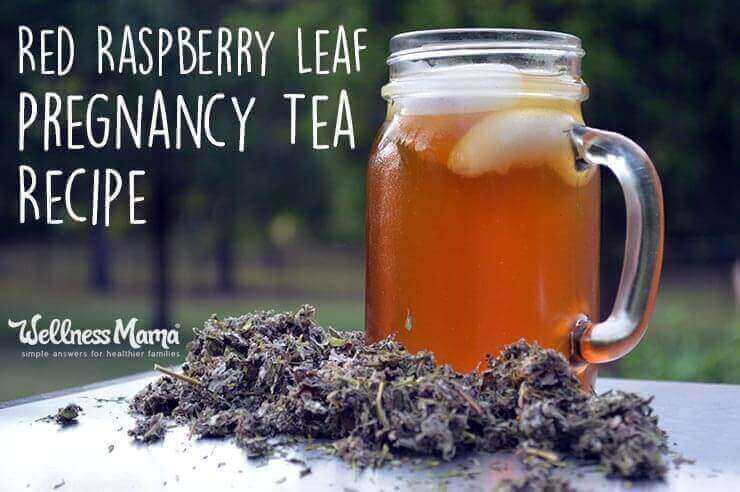I have used red raspberry leaf for years. It is an amazing multi-purpose and highly-nutritious herb with a delicious taste similar to regular black tea (but without the caffeine).
When pregnant, I start using red raspberry leaf tea as part of my pregnancy blend in late second and third trimester. Though red raspberry leaf tea is often recommended and touted for its ability to increase uterine contractions and shorten labor, its primary benefit might be in its nutritional value.
Why Red Raspberry Leaf Tea During Pregnancy?
Red raspberry leaf tea is most often recommended during pregnancy, and statistically up to 63% of midwives recommend red raspberry leaf to their clients.
The research is somewhat divided about how much red raspberry leaf consumption during pregnancy can benefit a woman in labor, but recent clinical studies have concluded that:
The findings suggest that the raspberry leaf herb can be consumed by women during their pregnancy for the purpose for which it is taken, that is, to shorten labour with no identified side effects for the women or their babies. The findings also suggest ingestion of the drug might decrease the likelihood of pre and post-term gestation. An unexpected finding in this study seems to indicate that women who ingest raspberry leaf might be less likely to receive an artificial rupture of their membranes, or require a caesarean section, forceps or vacuum birth than the women in the control group. (source)
While red raspberry was not found to shorten the first stage of labor, it did shorten the second stage of labor (pushing) by almost ten minutes and reduced the risk of forceps delivery with no adverse effects for mom or baby. (source)
Another study in rats showed that RRL could both strengthen or lessen contraction intensity, but that it did not affect the body’s ability to go into labor or duration. (source)
The important takeaways are that red raspberry leaf did not have any adverse affects for mom or baby in any of the published studies available and it showed a potential positive affect. Though many scientists would not consider a ten minute reduction in second stage labor statistically significant, I know most pregnant women would consider pushing for almost ten minutes less VERY significant (including myself).
Additionally, while it may not have a strong history of medical or clinical use, red raspberry leaf does have a long history of use by many midwives and pregnant women. Many claim that RRL helped improve their labors and recovery, compared to previous labors when they had not used it. This was my personal experience as well, and I always turn to RRL during pregnancy for this reason.
Skeptics might counter that this could be largely the placebo affect, but in the absence of any adverse effects and considering that placebo works a significant percentage of the time, I’d still consider it worth a try.
We will hopefully see continued research about the ways that RRL may or may not act on the uterus or affect the strength of contractions, but the available research indicates that it is at least safe to consume and doesn’t have any adverse effects.
In my opinion, the real benefit of red raspberry leaf is its nutrition content. Demand of nutrients important during pregnancy such as iron, B-vitamins, vitamin C, and magnesium, are especially high in pregnant women in second and third trimesters. All of these nutrients are present in red raspberry leaf. It is also high in anti-inflammatory tannins and can have a soothing affect on the digestive system.

Red Raspberry Leaf Pregnancy Tea Recipe
Servings
Ingredients
- 4 cups dried organic red raspberry leaf
- 1 cup dried alfalfa leaf
- 1 cup nettle leaf
- ½ cup dried dandelion leaf
Instructions
- Mix all ingredients together and store in an air-tight container.
- To brew a cup: Pour 8 ounces of boiling water over 1 tablespoon of the tea mixture and let steep for at least 5 minutes before drinking.
- To brew a gallon: Add ¾ cup tea mixture to a pot with 1 gallon of boiling water. Stir and let steep as it cools. Strain out the herbs and store in a pitcher or glass jar in the refrigerator to consume cold as desired.
Nutrition
Notes
Why Add Other Herbs?
Red Raspberry Leaf is very nutritious on its own and can absolutely be consumed alone, but I prefer to add the three additional herbs for their nutritional benefits:
Alfalfa:
Alfalfa is known as the “Father of all Foods” and is rich in many nutrients including magnesium, calcium, iron, potassium, silicon, and trace elements, as well as vitamin E, vitamin C, and vitamin K, which is necessary for blood clotting. Read about the benefits of alfalfa here.
Nettle:
Said to be anti-inflammatory, immune boosting, and good for digestion, nettle is another power-packed herb.
Dandelion Leaf:
Dandelion is also high in many vitamins and minerals and is also said to be good for the blood. It may have a normalizing effect on blood pressure and help with digestion and urinary heath (all beneficial during pregnancy).
Ever taken red raspberry leaf tea? How did you use it?


Leave a Reply